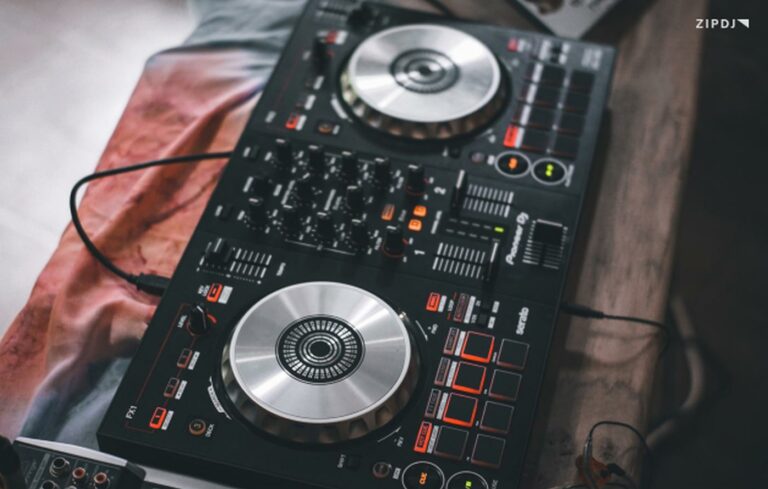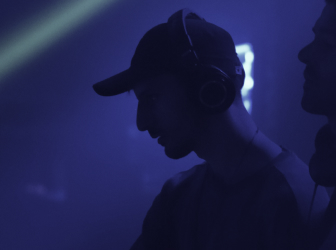DJ Equipment For Beginners: The Ultimate Guide For 2025

The best DJ equipment for beginners allows you to start on a budget and pick up great controllers, software, and other essential DJ gear you’ll need.
Whether you’re hoping to break into DJing in clubs or would like a mobile DJ career, there are many options to build a comprehensive DJ system.
In this guide, we’ve broken down everything you need to know to find the best DJ equipment, from controllers and mixers to accessories.

Beginner DJ Equipment: The Ultimate Guide For 2025
Choosing the best beginner DJ equipment can be daunting, with hundreds of different models available from a list of the world’s leading brands.
We’ve ensured this guide covers all the DJ gear you’ll need to get started and prepare for your first DJ set to help you get started without breaking the bank.
So, with that said, here’s everything you need to know about DJ equipment for beginners in 2025:
1. DJ Controller
When putting together the best DJ equipment for beginners, the first thing you’ll need to consider purchasing is a DJ controller for your sets.
A DJ controller system allows you to play music from multiple sources with core DJing features such as jog wheels, cueing tracks, and matching BPM.
If you’re a beginner DJ, you won’t need a controller that features all the tools on high-end gear, and there are plenty of models to choose from.
These include affordable Pioneer DJ controllers such as the Pioneer DJ DDJ 400, which offers excellent sound quality and performance.
Beginner DJs with more cash to spare can choose a more advanced DJ controller that includes performance pads and beat FX found in club-standard DJ gear.
You don’t have to fork out a huge sum of money, with some of the best DJ controllers offering a range of excellent features for a budget-friendly price.
Once you’ve chosen the best DJ controller for your needs and budget, you’re ready to start building up a music collection for your first DJ sets.
2. DJ Mixer
While some of the more expensive DJ controllers also include a DJ mixer, there are situations where you’ll need a dedicated mixer to perform.
These include a range of channels into which you can add individual input devices, such as turntables and CDJs, each of which has its own set of controls.
Any full DJ setup includes a mixer as an essential component since this is used to control the EQ levels of each channel as well as the all-important crossfader.
Depending on the model you opt for, a mixer can also include effects, such as the low, mid, and high-frequency filter passes.
If you choose to invest in a mixer with four channels or more, you’ll have the option to play multiple tracks for more complex DJ sets.
A DJ mixer also comes with a mic input, which is important if you’re hoping to launch a career working as a mobile or wedding DJ professionally.
Make sure you understand how to clean your DJ gear, as the mixer is the most likely to become clogged with dirt and dust, as many DJs can attest to.
3. DJ Software
Once you’ve selected your first DJ controller, it’s time to decide what DJ software you want to use to manage your playlists and perform your DJ sets.
You’ll be using your DJ controller to control DJ software, so it’s important to know what each platform offers and their compatible controllers.
If you’re new to using this DJ setup, there are plenty of online DJ courses you can sign up for to help you grasp the basics of mixing and track selection.
DJ software commonly used by many DJs includes Native Instruments Serato DJ Pro and the Pioneer DJ platform Rekordbox DJ.
There’s also Serato DJ Lite, a stripped-down version ideally suited to beginner DJs just finding their feet in the art form.
Once you’ve weighed up the pros and cons of software such as Traktor vs Serato, you can choose the platform with the best tool selection.
With DJ software an essential aspect of a professional DJ’s performance, it’s essential for taking the possibilities of your DJ equipment to the next level.
4. DJ Decks/Turntables
While many professional DJs use DJ software in conjunction with a controller for their live sets, there’s still a thriving market for traditional DJing with turntables.
The history of record players is interlinked with DJing, with models such as the Technics 1210s a staple feature of hip-hop DJing to this day.
If you’re thinking of performing a DJ set using turntables, you’ll need a separate mixer to input your turntables and perform a range of mixing techniques.
It’s a common medium for DJs who want to hone their scratching skills and use samples to elevate their sets in new and exciting directions.
Vinyl DJs also have the advantage of opening up their sources for new music, with many great tracks only available on limited-run white-label vinyl releases.
While most nightclubs tend to stick with controllers and laptop setups, the ability to mix with vinyl is a skill that’s well worth learning.
5. Laptop
Once you’ve selected a DJ controller and the software to manage music, you’ll need a laptop to run everything into the sound system.
While your controller will be doing much of the hard work of processing the music and effects, your laptop needs to be powerful enough to run the software.
This means investing in a laptop with enough RAM and hard drive space to store and play all of your tracks without any lag or crashing.
It also means choosing one that is lightweight and highly portable since you’ll need to keep your overall DJ gear weight to a minimum when traveling to venues.
Additionally, a great DJ laptop should be powerful enough to run a digital audio workstation if you’re planning on entering the realm of DJ production.
Apple’s line of laptops is commonly used by DJs, with other companies such as ASUS and Razer also known for their quality and reliability.
With Apple’s announcement of a modular laptop capable of running turntables changing how DJs function, a laptop is another essential gear item.

6. DJ Headphones
When performing DJ sets, you’ll need to use DJ headphones to monitor the incoming track and get it cued up, ready to drop into the mix.
DJ headphones help you to do this by blocking out the noise from any currently playing track and focusing clearly on the new track through your mixer.
While the best DJ headphones can be expensive, plenty of entry-level models deliver high-quality performance that you can use to get started.
The first thing to consider when choosing headphones is how comfortable they are since you’ll be wearing them throughout your DJ sets.
You’ll want to invest in headphones with a closed-back design to help block out external sounds, preferably with additional noise-cancellation features.
Great DJ headphones should also be durable and reliable, as they’ll likely face plenty of wear and tear as you go from one event to another.
They should also deliver responsive performance across all frequency ranges and be clear and precise even when external music is being played at high volumes.
7. Microphone
There are two main types of microphones to be mindful of when considering which is the best for your DJing requirements, should you need one for your sets.
Dynamic microphones are handheld models used by singers and rappers, while powered condenser mics are typically plugged into a hardware device.
While many club DJs prefer to avoid MCing, if you’re playing hip-hop or drum and bass, a mic is an asset when collaborating with artists.
Likewise, if you’re looking into how to DJ a wedding, you’ll realize that a mic is also crucial so you can make announcements and handle audience requests.
Some DJs in this field recommend using a wireless lapel microphone for wedding events since members of the public may feel put off by a handheld mic.
In this instant, you can attach the mic to their shirt or top, and it will function as intended without the need to pass on any instructions for use.
There are lots of budget-friendly microphones on the market, so you don’t have to buy high-end models from Shure on day one.
8. Speakers & Monitors
With your controller, software, and headphones all sorted, you’ll need to pick up a PA system so you can hear the great music you’re performing in your sets.
If you’re a beginner DJ, you can pick up a set of speakers and monitors for reasonable prices, especially if you’re willing to check out the second-hand market.
You’ll want speakers that deliver great sound quality with strong basslines and crisp, clear mids and highs to make the most of your music’s production values.
A monitor speaker is also important since this is used to help you line up hot cues and keep any tracks you’re introducing into the mix correctly synced.
If you’re planning on using your speakers in venues, you’ll need more powerful models compared to simply DJing for fun in your bedroom at home.
Active speakers can be used without an amplifier, while passive speakers require a dedicated amp integrated into your beginner DJ setup.
Spend some time researching the best DJ speakers and see what you can find that matches your budget and the size of the room you will use them in.
9. Lighting
If you’re thinking of becoming a mobile or wedding DJ or want to host a wild party, you’ll need to pick up a set of DJ lights for your performances.
While the best DJ visuals can cost hundreds of thousands of dollars, many great DJ lighting options can be picked up on a much smaller budget.
The old days of three-color disco lights flashing in sequence are long gone, with advancements in LED lighting technology offering impressive creative choices.
You can use these to sync a range of patterns to the music, with LED lights delivering the full spectrum of colors and effects to dazzle your audience.
There are also affordable options for strobe lights and lasers to include in your rig if you plan on putting on more adventurous light displays.
10. Backup Equipment
Last but not least, it’s essential that you pick up a selection of backup equipment you can fall back on in case of emergency during your DJ sets.
Having a DJ set ruined because of equipment failure is one of the common DJ mistakes to avoid, making backup gear crucial.
Picking up an extra set of cables won’t cost too much but will rescue you from disaster should your primary cables break during a set.
If you have the cash to spare, picking up a backup microphone and pair of headphones to stow in your bag is also highly recommended to avoid getting caught short.
As beginner DJs develop over time and upgrade their equipment, they can keep their entry-level gear for backup, further saving money.
Over time, this can help you build up a long list of backup equipment covering everything from a DJ controller to a CD player and even an extra set of speakers.
Summary
So, there you have it, our complete guide to the essential DJ gear you’ll need as a beginner to start putting together killer DJ mixes.
This equipment comes in various budgets, so you can still start building a music collection and DJing without breaking the bank.
As you continue to improve your skills over time, you can consider upgrading to professional-level equipment that brings a broad range of features to the table.
Master your DJ equipment with a ZIPDJ subscription and access the latest tracks and remixes.
Not a member ?
Join Today for Unlimited Music Downloads. Visit zipdj.com for more information.



